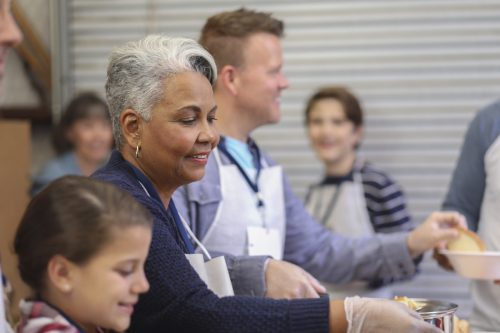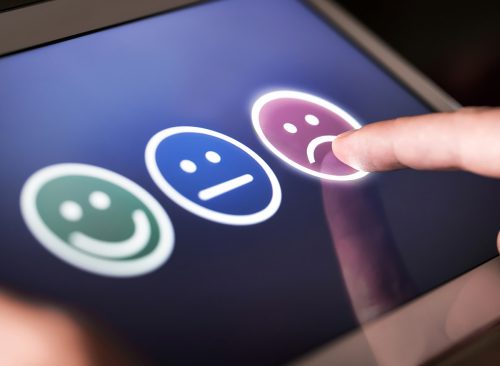7 Ways to Keep Calm When it Feels Like the World Is Falling Apart
Psychotherapist Esther Perel offers her top tips for not letting the news get the best of you.

With all the political unrest and the devastating loss of lives in Israel and Gaza, it has been a difficult month for people around the world. Recently, on New York Magazine's Pivot podcast, Kara Swisher and NYU Professor Scott Galloway welcomed world-renowned psychotherapist Esther Perel to discuss the impact that the Israel-Hamas war is having on people and their abilities to stay calm.
During the podcast, Perel revealed seven ways to keep calm when it feels like the world is falling apart. Take this advice to heart the next time you feel like the latest unsettling news is getting the best of you and your emotions.

The first thing to do is to take a moment and let everything sink in. Perel explains that in the initial moment, "we are not working through anything," and people are in shock. "People are emotionally numb. People are in deep, deep grief. People are frightened. There is terror, and there is counter-terror, and on all sides." At this moment, people have "just begun to understand" and should not immediately react.

While "the response when one is attacked, and one is an animal as we are, is that we try to counter-attack and to go at it stronger, harder and to defend ourselves and to not feel the helplessness, the weakness, and the terror that invades us," Perel recommends not doing so. "All of this is deeply animalistic and it's probably very important to not take many, many moral stances on this, especially for the people who are far away. There is so much hatred and it is very important that the people who are around these fighting factions not add more oil to the fire and not stew the hatred further," she says. "Hurt people, hurt people and to the point that it really risks dehumanizing us, we feel we have been dehumanized, we respond with the same. We think it's going to protect us. And on occasion it does. And then sometimes it goes too far and it even destroys us."

"So what you do after that, when you feel like the tide is rising inside of you and you just feel like you don't know what to do with all of this is the most thing is to come together with others to experience collective trauma collectively, to understand that this is changing something in the world, not just in the Middle East, and to read poetry, to talk about what's happened, to ask people where they are," she says. "I think allyship is extremely important in a moment like this," she continues. "So now when somebody writes to you just to say, I know you have an attachment to that place, or I know you know people there, or I know you were there recently, or something that says, I know I see you. There's nothing else for me to say. And you answer, this means a lot. You thought of me, I exist in your collective awareness."
RELATED: 11 Easy Things You Can Do to Slow Down Aging

Perel also suggests that you should "listen" and "try not to judge" other people. "We can get into political discussions. We know what the story is. We are a bunch of informed people, but this is not the moment. It's like people don't have much rationality. So you hold, you contain, you make them feel like you want to hear it, you can tolerate it, you care, and you create an envelope," she says.

"What helps a lot in general, what helps a lot is for people to get active, to do something, to not feel like you're sitting there helplessly, just taking it all in," she said. "Volunteer, send stuff, write to people, alert people, inform, read carefully, and read stuff that doesn't just describe your side of where you stand," Perel suggests.

Perel also suggests using social media with caution, as messages often get misconstrued. Instead, she suggests talking to people about the situation in the flesh. She points out that people are "always looking at their phones, they're online. And I think this situation in Israel is even worse because of that, right? There's nowhere to grieve. You can't have a discussion about it. And so everyone's interacting there and not with each other. You certainly wouldn't have the same biting that you talked about in person. You just don't. Some people might certainly, but most people don't have that biting when they're in a physical situation," she says. When connecting on social media it is only a "partial connection" and should only be used to bring people physically together. "The platforms are useful, but they are useful in order for us to get off them."

"Tere can be a struggle between trying to stay informed," Perel says, discussing the dangers of "doom scrolling" or looking at gruesome images. "If you've seen an image once, if you read the story, don't go look for the image," she says. "Don't just watch it over and over again. You will not sleep. You literally will not sleep. I am not sleeping and I didn't watch much. I just talk to people and that's enough."
Esther Perel is a psychotherapist and an author. For over 30 years, she has been counseling people, struggling with love, infidelity, grief and loneliness. As the host of the Vox Media podcast, where should we begin? Esther invites listeners into her office each week as she helps real couples work through conflict. Esther, we're glad to have you this week because a lot of people are struggling with what they're seeing in the news. So where does someone even start when it comes to dealing with what's happening in Israel on an emotional level?





















